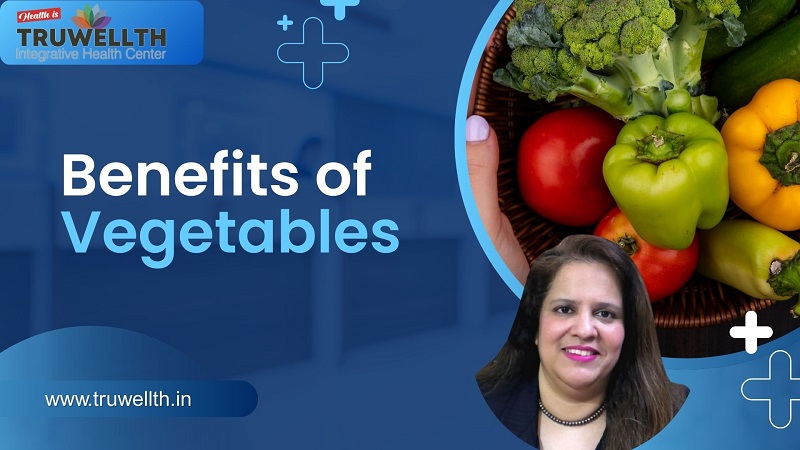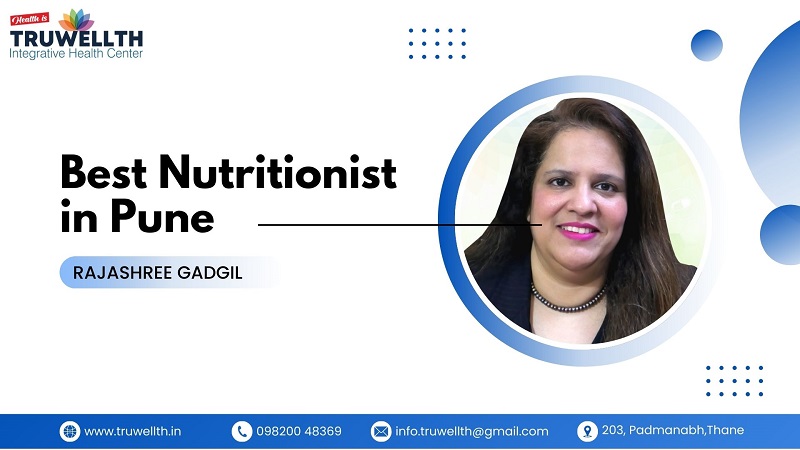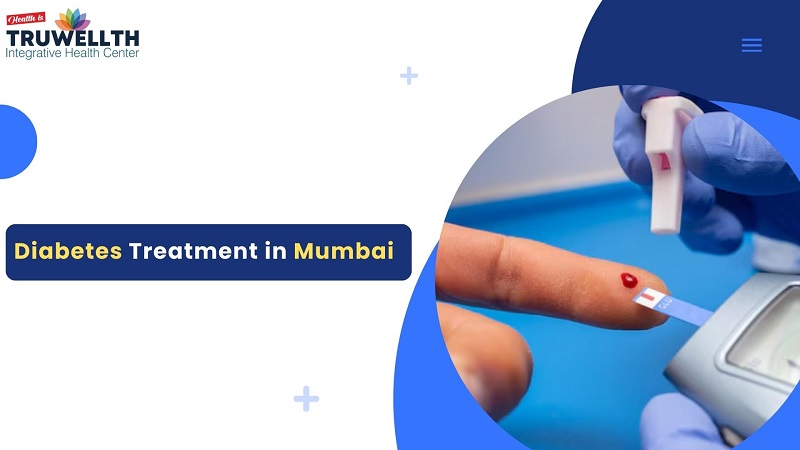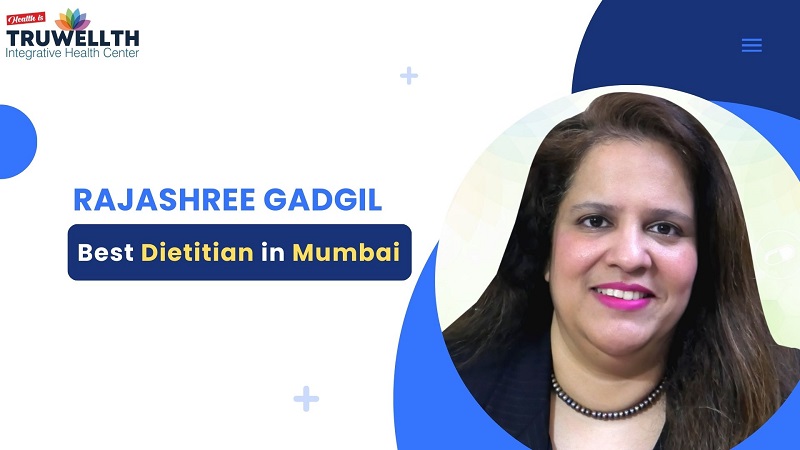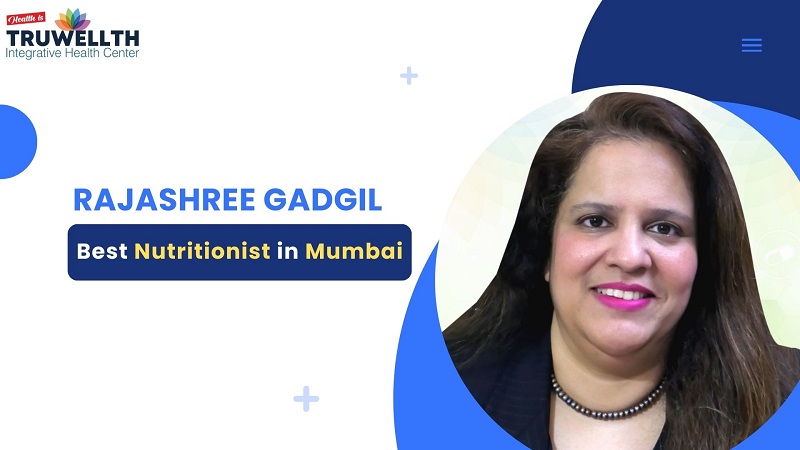Living with diabetes means taking active steps every day to manage blood sugar levels, reduce complications, and boost overall health. Along with diet, blood sugar monitoring and medication when needed, yoga exercise for diabetes patient has emerged as a natural, gentle and effective way to support insulin sensitivity, digestion, stress reduction and metabolic health. In this blog, we’ll explore yoga routines you can do at home, specific poses with pictures (described), and how to integrate yoga exercise for diabetes patient into your lifestyle — including 30-minute flows, YouTube resources, and tips for beginners. We’ll also include trusted guidance for diabetes diet & management in India, including Diabetes dietitian in Mumbai, Diabetes dietitian in Pune, and the best diabetes treatment support at TruWellth Integrative Health Center founded by Rajashree Gadgil. What is Yoga Exercise for Diabetes Patient & Why it Helps? For people living with diabetes — especially type-2 diabetes — managing blood glucose is essential. Yoga exercise for diabetes patient isn’t just stretching: it’s a combo of postures (asanas), breathing (pranayama), relaxation and mindful practice that can: Improve insulin sensitivity and support pancreas function Reduce stress and cortisol — hormones that spike blood sugar Boost digestion and metabolism Enhance balance, strength and mobility Support weight management naturally Yoga is safe for most people, including seniors, when done correctly and regularly. A daily 20–30 minute routine is often recommended to see meaningful benefits. Yoga Exercise for Diabetes Patient in Hindi यहाँ कुछ आसान योगासन हैं जो डायबिटीज नियंत्रण में मदद करते हैं: वज्रासन (Vajrasana) – पेट के बाद बैठ कर 5-10 मिनट तक गहरी साँसें लें, इससे पाचन बेहतर होता है और इंसुलिन नियंत्रण में मदद मिलती है। 2. भुजंगासन (Bhujangasana) – पेट के अंगों पर दबाव डालकर पैनक्रियास को सक्रिय करता है। 3. दण्डासन (Dhanurasana) – पेट और पीठ को मजबूत बनाता है; पाचन बेहतर करता है। 4. अर्ध मत्स्येन्द्रासन (Ardha Matsyendrasana) – कमर-पीठ और पेट के अंगों पर मालिश करता है। 5. पास्चिमोत्तानासन (Paschimottanasana) – हैमस्ट्रिंग खींचता है और तनाव को कम करता है। ये सभी आसन रोज़ सुबह खाली पेट अभ्यास करने पर सबसे ज़्यादा लाभदायक हैं। 7 Yoga Poses for Diabetes (With Pictures Explained) Here are 7 proven poses that are effective for managing blood sugar and boosting overall metabolic health. Vajrasana (Thunderbolt Pose) Sit on your heels with your spine straight. Breathe deeply for 5–10 minutes. Great for digestion and blood sugar control. Bhujangasana (Cobra Pose) Lie on your stomach, hands by shoulders, lift your chest up. This stimulates abdominal organs and supports pancreas function. Dhanurasana (Bow Pose) Lie on the stomach, bend knees, hold ankles and lift chest and legs together — enhances insulin secretion. Ardha Matsyendrasana (Half Spinal Twist) Sit with legs extended, bend one knee and twist — massages internal organs. Paschimottanasana (Seated Forward Bend) Stretch forward from the hips — helps calm nerves and supports digestion. Tadasana (Mountain Pose) Stand tall with arms raised — improves posture, circulation and insulin sensitivity. Vrikshasana (Tree Pose) Balance on one foot — enhances focus while stimulating metabolic organs. Note: Always start slowly and practice mindful breathing with each pose. Yoga for Diabetes Patients at Home – 30 Minutes Routine Here’s a simple 30 minutes yoga for diabetes routine you can do at home: 5 mins – Deep breathing / Pranayama 5 mins – Vajrasana + simple stretches 10 mins – Bhujangasana + Dhanurasana sets 5 mins – Twists: Ardha Matsyendrasana + Paschimottanasana 5 mins – Cool down with Tadasana and gentle breaths This balanced routine addresses digestion, circulation, stress relief and flexibility — key areas for diabetes management. You Might Refer Reading: Diabetes Management in Mumbai Diet & Professional Support: Beyond Yoga While yoga offers tremendous benefits, comprehensive diabetes management also requires proper diet planning and medical support. Best Diabetes Dietitian in Mumbai & Pune If you’re in India and looking for expert guidance, Rajashree Gadgil — a highly regarded nutritionist and diabetes dietitian — can help you design a personalized diabetes diet plan that works with yoga and lifestyle changes. She is the founder of TruWellth Integrative Health Center, one of the best diabetes treatment centers in Mumbai known for: Personalized diabetes diet plans Nutritional counseling for glycemic control Holistic lifestyle support Support for both type-1 and type-2 diabetes Whether you’re looking for a Diabetes dietitian in Mumbai, Diabetes dietitian in Pune, or professional diabetes management advice, expert support like Rajashree Gadgil’s program at TruWellth can make a big difference. Final Thoughts Yoga exercise for diabetes patient is a safe, affordable and effective way to support your diabetes journey when practiced regularly — especially combined with the right diet and professional care. Begin with basic poses, stay consistent, and track your progress over time. For best results, pair yoga with a diabetic-friendly diet and consult a qualified diabetes dietitian like Rajashree Gadgil from TruWellth Integrative Health Center for tailored advice. Your health is a journey — start with mindful movement today. 🧘♂️✨
Read More
A major international study published in The Lancet has found that just over one in every 10 deaths from infectious diseases worldwide can be linked to obesity, highlighting a significant global public health challenge. Researchers analysed health and mortality data from more than 540,000 adults in the UK Biobank and Finnish cohorts, tracking participants over more than a decade to investigate how body weight affects infection outcomes. Obesity Raises Infection Severity & Death Risk People with obesity — defined as a body mass index (BMI) of 30 or higher — were found to be roughly 70 % more likely to be hospitalised or die from infections than those with a healthy weight. This elevated risk held across a broad range of infections, including flu, pneumonia, COVID-19, stomach and urinary tract infections. The danger rose steadily with increasing BMI; individuals with the most severe obesity (BMI ≥ 40 kg/m²) faced about three times the risk of serious infection compared with healthy-weight adults. Burden Varies by Country & Region When the research team applied their findings to Global Burden of Disease mortality data, they estimated that obesity may have contributed to approximately 0.6 million of the 5.4 million infectious disease deaths in 2023 — about 10.8 % globally. The impact, however, differed between nations: In the United States, obesity was linked to roughly one in four infectious disease deaths, In the United Kingdom, about one in six deaths were obesity-associated, Countries with lower obesity prevalence, such as Vietnam, showed notably lower proportions. Why Obesity Increases Infection Risk? Scientists suggest that obesity may weaken immune defences, leading to poorer outcomes from infections. Chronic inflammation, metabolic disturbances, and impaired immune responses are among the possible biological mechanisms being explored. However, the observational nature of the study means it can’t prove direct causation — only a strong association. Public Health Implications & Recommendations With global obesity rates rising, researchers warn that the number of infection-related hospitalisations and deaths linked to excess weight may grow if preventative efforts are not strengthened. Experts recommend policies that support healthy lifestyles, such as improving access to nutritious foods, encouraging physical activity, and promoting vaccination, particularly for people with obesity. Key Takeaway The research adds to the evidence that obesity isn’t only a risk factor for chronic conditions like diabetes and heart disease — it also significantly influences outcomes from acute infectious diseases, underscoring the importance of weight management as part of comprehensive public health strategies.
Read More
Vegetables are the foundation of a healthy and balanced diet. From improving digestion to boosting immunity, the benefits of vegetables go far beyond just filling your plate with color. Nutrition experts and dietitians consistently recommend eating a variety of veggies daily to support overall wellness, prevent lifestyle diseases, and maintain ideal body weight. According to Rajashree Gadgil, the best dietitian in Thane and Mumbai, adding seasonal vegetables to your meals is one of the simplest ways to transform your health naturally. At her TruWellth Integrative Health Center, the leading Dietitian Center in Thane and Mumbai, personalized nutrition plans focus heavily on eating veggies for long-term fitness and disease prevention. Let’s explore the top 10 benefits of vegetables and why they deserve a central place in your everyday diet. Top 10 Benefits of Vegetables Here below find, top known benefits of vegetables… Boost Immunity Vegetables are rich in vitamins A, C, and E, along with antioxidants that strengthen your immune system. Regular intake helps your body fight infections and illnesses. Improve Digestion High fiber content is one of the biggest benefits of vegetables. Fiber promotes smooth bowel movements, prevents constipation, and supports gut health. Support Weight Management Eating veggies keeps you full for longer while being low in calories. This makes them ideal for weight loss and weight maintenance programs. Control Blood Sugar Non-starchy vegetables help regulate blood glucose levels, making them excellent for diabetics or those at risk. Promote Heart Health Leafy greens, carrots, and cruciferous vegetables reduce cholesterol and lower blood pressure, supporting cardiovascular health. Improve Skin and Hair Antioxidants and hydration from vegetables enhance skin glow and hair strength. Detoxify the Body Vegetables like cucumber, spinach, and beetroot help flush toxins naturally from the body. Increase Energy Levels Natural vitamins and minerals improve metabolism and stamina. Reduce Risk of Chronic Diseases Cancer, obesity, hypertension, and heart diseases can be prevented with regular vegetable intake. Enhance Brain Function Certain vegetables like broccoli and spinach contain nutrients that support memory and cognitive health. 5 Benefits of Vegetables You Should Know Daily If you want a quick summary, here are 5 benefits of vegetables you experience every day: Better digestion Stronger immunity Improved weight control Clearer skin More energy Simply adding one bowl of vegetables to every meal can make a noticeable difference. Benefits of Vegetables for Kids Growing children need proper nutrition, and the benefits of vegetables for kids are especially important. Vegetables help: Support growth and bone strength Improve concentration and brain development Build immunity Prevent childhood obesity Encourage healthy eating habits early Dietitian Rajashree Gadgil often advises parents at her Dietitian Center in Thane to introduce colorful vegetables in creative ways like soups, parathas, smoothies, or cutlets to make eating veggies fun for kids. Uses of Vegetables in Daily Diet Vegetables are incredibly versatile. The many uses of vegetables include: Salads Soups Stir-fries Juices Smoothies Curries Stuffed parathas or wraps Whether raw, steamed, roasted, or sautéed, vegetables can fit into any meal easily. Advantages and Disadvantages of Eating Vegetables Advantages: Low in calories High in fiber Rich in vitamins and minerals Easy to digest Affordable and widely available Disadvantages: Overcooking may reduce nutrients Some people may experience bloating with excess fiber Pesticide exposure if not washed properly However, the advantages clearly outweigh the disadvantages. Choosing fresh, seasonal, and organic vegetables solves most concerns. Benefits of Vegetables and Fruits Together Combining both multiplies nutrition. The benefits of vegetables and fruits include: Better hydration Natural detoxification Improved metabolism Reduced cravings for junk food Balanced micronutrients A mixed plate of fruits and vegetables gives your body everything it needs for complete wellness. Benefits of Vegetable Soup Vegetable soup is one of the easiest ways of eating veggies, especially for those who dislike salads. The benefits of vegetable soup include: Easy digestion Keeps you full longer Excellent for weight loss Perfect for recovery during illness Provides hydration and nutrition simultaneously Many clients at TruWellth are advised to include vegetable soups during detox or weight management plans. Expert Advice from a Dietitian According to Rajashree Gadgil, recognized as the best dietitian in Thane and Dietitian in Mumbai, most health problems today are due to poor dietary habits and low vegetable intake. She recommends: At least 3–5 servings daily Including green leafy vegetables 3–4 times a week Eating seasonal produce Avoiding deep-fried vegetables Choosing home-cooked meals At TruWellth Integrative Health Center, the most trusted Dietitian Center in Mumbai and Thane, customized meal plans ensure patients incorporate the right quantity and variety of vegetables for their goals—whether it’s weight loss, diabetes management, or overall health improvement. Conclusion The benefits of vegetables are too powerful to ignore. From improving digestion and immunity to preventing chronic diseases, vegetables truly are nature’s medicine. By consciously eating veggies every day, you invest in a healthier, longer, and more energetic life. If you’re unsure how to plan your diet or want professional guidance, consulting Rajashree Gadgil at TruWellth can help you build sustainable habits. Remember, good health starts on your plate—and vegetables should always take center stage.
Read More
In today’s fast-paced lifestyle, health often takes a backseat. Poor eating habits, stress, lack of exercise, and medical conditions like diabetes, obesity, and thyroid disorders make professional nutrition guidance essential. This is where consulting a qualified nutritionist in Pune can make a life-changing difference. Whether you want to lose weight, gain healthy muscle mass, manage a disease, or simply improve your overall well-being, working with the best nutritionist in Pune ensures that you receive personalized diet plans tailored to your body’s needs. If you’re searching for a nutritionist in Pune near me, this guide will help you understand what to look for and where to find the right expert. Why You Need a Nutritionist in Pune A professional nutritionist does more than just provide a diet chart. They: Analyze your body composition Understand your lifestyle and eating patterns Identify nutritional deficiencies Create sustainable meal plans Monitor progress regularly With increasing lifestyle diseases in metro cities, consulting a trusted nutritionist in Pune has become a necessity rather than a luxury. Meet Rajashree Gadgil – The Best Nutritionist in Pune When it comes to trusted names in clinical and lifestyle nutrition, Rajashree Gadgil stands out as the best nutritionist in Pune. She is widely recognized for her science-backed, practical, and sustainable approach to health. She is the founder of TruWellth Integrative Health Center, known as the leading nutrition center in Pune that offers holistic nutrition solutions for: Weight loss Weight gain Diabetes management PCOS/PCOD care Heart health Child nutrition Sports nutrition Her customized plans focus on long-term lifestyle changes rather than crash diets, making her a top choice for those searching for the best dietician in Pune near me. TruWellth has also expanded its trusted services as a nutrition center in Mumbai and supports clients looking for a nutritionist in Mumbai and nutritionist in Thane as well. Best Nutritionist in Pune for Weight Loss Struggling with stubborn fat despite workouts and dieting? A professional nutritionist in Pune can help you: Burn fat safely Improve metabolism Reduce cravings Build healthy habits Maintain long-term weight loss At TruWellth Integrative Health Center, clients receive structured plans that combine balanced meals, portion control, and lifestyle modifications. This makes Rajashree Gadgil the Best Nutritionist in Pune for weight loss for many families and working professionals. Best Nutritionist in Pune for Weight Gain Weight gain is just as challenging as weight loss. Many people struggle with low body weight, weak immunity, or low muscle mass. The Best nutritionist in Pune for weight gain focuses on: High-calorie nutritious foods Protein-rich meals Muscle-building diet plans Digestive health Strength-based nutrition Rajashree’s customized programs ensure healthy and natural weight gain without unhealthy junk food or fat accumulation. Best Sports Nutritionist in Pune Athletes and fitness enthusiasts require specialized nutrition to enhance stamina, performance, and recovery. A best sports nutritionist in Pune understands: Pre- and post-workout nutrition Protein timing Hydration strategies Supplement guidance Energy optimization TruWellth provides performance-based diet planning for runners, gym-goers, and sports professionals to help them achieve peak performance safely. Top 10 Nutritionist in Pune – How to Choose the Right One If you are exploring the Top 10 nutritionist in Pune, consider these factors: Qualifications Certified degree in nutrition/dietetics Experience Clinical and lifestyle nutrition expertise Personalized Approach Avoids generic diet charts Reviews & Results Real client testimonials Ongoing Support Regular follow-ups and tracking Rajashree Gadgil’s extensive experience and patient-focused care consistently place her among the Top 10 nutritionist in Pune. Nutritionist Course in Pune – A Growing Career Option Health awareness is rising rapidly, creating demand for professional nutritionists. Many institutes now offer a Nutritionist Course in Pune that covers: Clinical nutrition Sports nutrition Therapeutic diets Weight management Diet planning If you’re passionate about helping others lead healthier lives, pursuing this course can be a rewarding career path. Benefits of Choosing a Trusted Nutrition Center in Pune Visiting a professional nutrition center in Pune like TruWellth offers: Personalized diet counseling Body composition analysis Medical nutrition therapy Online & offline consultations Long-term health monitoring Unlike random online plans, a structured nutrition center ensures professional accountability and expert supervision. Nutrition Services Beyond Pune Health concerns are universal, and TruWellth caters to clients across cities. If you’re located elsewhere, you can also find expert support through: nutritionist in Mumbai nutritionist in Thane nutrition center in Mumbai Their online consultations make professional nutrition advice accessible no matter where you live. Final Thoughts Your health is your biggest investment. Instead of experimenting with fad diets or unverified advice, consult an experienced nutritionist in Pune who understands your unique body needs. If you are looking for the best nutritionist in Pune, Rajashree Gadgil and her TruWellth Integrative Health Center offer comprehensive, science-based, and sustainable solutions for weight loss, weight gain, disease management, and overall wellness. Whether you’re searching for a nutritionist in Pune near me, the Best Nutritionist in Pune for weight loss, or the Best sports nutritionist in Pune, choosing the right expert can transform your health journey. Start today — because good nutrition is the foundation of a healthy life.
Read More
Managing type 2 diabetes can feel challenging, especially when it comes to planning your meals. The right diet not only helps control blood sugar levels but also keeps you energized throughout the day. Diabetes food recipes that are simple, nutritious, and easy to prepare can make all the difference. Whether you are looking for breakfast, lunch, or dinner recipes or quick 3-ingredient meals, this guide will help you enjoy tasty meals without compromising your health. Easy Meals for Diabetics Type 2 For people with type 2 diabetes, maintaining stable blood sugar is key. Simple meals with the right balance of proteins, healthy fats, and fiber-rich carbohydrates are ideal. Some easy meals include: Vegetable dal with brown rice: A wholesome combination of protein and fiber. Grilled paneer salad: Paneer provides protein while fresh veggies offer fiber. Oats porridge with nuts: A filling breakfast that won’t spike your sugar. These meals are not only simple but also easy to prepare, making daily diabetes management much easier. Diabetic Recipes for Breakfast, Lunch, and Dinner Breakfast Starting your day with a healthy breakfast sets the tone for balanced blood sugar levels. Try these: Moong dal chilla: High in protein, low in carbs. Vegetable upma with oats: Fiber-rich and filling. Greek yogurt parfait: Layer with seeds and low-sugar fruits. Lunch Lunch should be hearty yet diabetes-friendly: Quinoa pulao with vegetables: A complete meal packed with protein and fiber. Grilled chicken salad with spinach and cucumber: Low-carb, nutrient-rich. Mixed lentil soup: Easy to digest and keeps blood sugar in check. Dinner Dinner should be light and easy to prepare: Stir-fried tofu with vegetables: Quick, nutritious, and satisfying. Vegetable soup with multigrain toast: A low-calorie, fiber-rich option. Zucchini noodles with tomato sauce: A low-carb alternative to pasta. Diabetes Food Recipes Indian Style Indian cuisine can easily be adapted for diabetes management. Traditional recipes can be modified to reduce sugar and refined carbs while retaining flavor: Chapati with moong dal sabzi: Replace white flour with whole wheat or millet flour. Vegetable sambar with brown rice: A fiber-rich South Indian favorite. Paneer bhurji with whole wheat toast: Quick, protein-packed, and satisfying. These Indian diabetes food recipes are not only delicious but also promote better blood sugar control. 3 Ingredient Recipes for Diabetics Sometimes simplicity is the key. 3-ingredient diabetic recipes are perfect for busy individuals: Egg and spinach scramble: Eggs + spinach + olive oil Cucumber raita: Yogurt + cucumber + mint Grilled chicken with spices: Chicken + turmeric + pepper These recipes are fast, cheap, and still healthy for managing type 2 diabetes. Simple & Easy Diabetic Recipes If you’re looking for simple diabetic recipes, the goal is to use minimal ingredients and time while ensuring nutrition: Vegetable stir-fry with tofu Chickpea salad with tomatoes and cucumber Oats and almond smoothie These meals are perfect for individuals who want easy, cheap diabetic meals without sacrificing taste. Easy Diabetic Dinner Recipes Even dinner can be easy and satisfying for diabetics: Grilled fish with steamed vegetables Lentil soup with spinach Stuffed bell peppers with quinoa and veggies These easy diabetic dinner recipes keep meals light, healthy, and blood sugar-friendly. All Recipes Diabetic Meals When planning all recipes for diabetic meals, the key principles are: Include fiber-rich foods like vegetables, whole grains, and legumes. Choose lean protein such as paneer, tofu, eggs, or chicken. Limit refined carbs and sugar. Use healthy fats like olive oil, nuts, and seeds. Following these principles ensures your meals remain tasty while controlling diabetes effectively. Consult a Diabetes Dietitian for Personalized Guidance While these diabetes food recipes are great for general guidance, personalized nutrition plans are always more effective. Rajashree Gadgil, the best diabetes dietitian in Mumbai, Thane, and Pune, specializes in creating individualized meal plans for people with type 2 diabetes. She founded TruWellth Integrative Health Center, recognized as the best dietitian center for diabetes management. Consulting a qualified diabetes dietitian ensures your meals are tailored to your needs, lifestyle, and blood sugar targets. Why Choose TruWellth Integrative Health Center At TruWellth, the focus is on holistic health: Personalized meal plans Easy-to-cook recipes Ongoing guidance and support Monitoring and adjustment for optimal results Whether you are looking for diabetes food recipes Indian style or easy, 3-ingredient meals, TruWellth provides everything you need to manage diabetes without feeling restricted. Conclusion Managing type 2 diabetes doesn’t mean giving up on flavor. With these diabetes food recipes, you can enjoy breakfast, lunch, and dinner while keeping your blood sugar stable. From easy Indian meals to simple 3-ingredient recipes, there are plenty of delicious options. For the best results, consult Rajashree Gadgil, the leading diabetes dietitian in Mumbai, Thane, and Pune, at TruWellth Integrative Health Center — the ultimate dietitian center for personalized diabetes management. Start your journey today with easy, tasty, and healthy diabetic meals that work for your lifestyle!
Read More
Polycystic Ovary Syndrome (PCOS) is one of the most common hormonal disorders affecting women today. Irregular periods, weight gain, acne, hair fall, insulin resistance, and fertility issues are some of the most common symptoms. While medications play a role, diet and lifestyle changes are the foundation of PCOS management. Knowing the right foods—and more importantly, the PCOS food list to avoid—can make a massive difference in symptom control. According to Rajashree Gadgil, the best nutritionist to consult for PCOS, a structured, personalized diet can help reverse insulin resistance, support weight loss, and improve fertility naturally. At her TruWellth Integrative Health Center, patients receive evidence-based PCOS nutrition plans at leading Nutrition Centers in Thane, Mumbai, and Pune. Why Diet Matters in PCOS? PCOS is closely linked with insulin resistance and chronic inflammation. Eating the wrong foods can spike blood sugar levels, worsen hormonal imbalance, and make weight loss extremely difficult. That’s why understanding the PCOS food list to avoid is essential before planning what to eat. A well-planned diet helps: Regulate menstrual cycles Improve insulin sensitivity Promote sustainable weight loss Improve ovulation and fertility Reduce acne and hair fall PCOS Food List to Avoid (Most Important Section) If you have PCOS, avoiding the following foods is critical for hormonal balance and weight control. 1. Refined Carbohydrates Refined carbs spike insulin levels, worsening PCOS symptoms. White bread Maida products Pasta White rice Bakery items These foods should be at the top of the PCOS food list to avoid. 2. Sugary Foods & Beverages Added sugar leads to insulin resistance and weight gain. Soft drinks Packaged juices Sweets and chocolates Cakes, pastries, cookies 3. Processed & Packaged Foods Highly processed foods increase inflammation. Chips Instant noodles Frozen meals Ready-to-eat snacks 4. Fried & Trans-Fat Foods These disrupt hormonal balance and worsen inflammation. Deep-fried snacks Fast food Margarine Commercially baked goods 5. Excess Dairy (in Some Women) Dairy may increase androgen levels in certain PCOS patients. Full-fat milk Cheese Ice cream A nutritionist in Mumbai or Thane can help decide whether dairy should be eliminated or limited. 6. Red & Processed Meats These increase inflammation and insulin resistance. Sausages Bacon Processed meats Following this PCOS food list to avoid consistently can significantly reduce symptoms within weeks. PCOS Food List to Eat (Healthy Alternatives) Once you remove trigger foods, replacing them with nutrient-dense options is key. PCOS Super Food List Millets (jowar, bajra, ragi) Quinoa and oats Leafy greens Nuts and seeds (flaxseeds, chia seeds) Fatty fish (omega-3 rich) Best Fruits for PCOS Weight Loss Low-glycemic fruits are ideal: Berries Apples Pears Kiwi Guava These fruits support weight loss without spiking insulin. Best Diet for PCOS Weight Loss The best diet for PCOS weight loss focuses on: Low glycemic index foods High fiber Adequate protein Healthy fats Rajashree Gadgil, a leading Nutritionist in Thane and Mumbai, emphasizes sustainable fat loss rather than crash dieting, which often worsens PCOS. PCOS Weight Loss Diet and Exercise Diet alone is not enough. Combine it with: Strength training (3–4 times/week) Brisk walking or cycling Yoga for hormone balance Stress management This integrated approach is followed at TruWellth Integrative Health Center, a trusted Nutrition Center in Mumbai and Pune. Best Diet for PCOS and Fertility For women planning pregnancy, the best diet for PCOS and fertility includes: Adequate protein intake Antioxidant-rich foods Iron, zinc, and folate-rich foods Stable blood sugar control Avoiding foods from the PCOS food list to avoid improves ovulation and egg quality naturally. 7-Day PCOS Diet Plan PDF (What It Includes) A professionally designed 7-day PCOS diet plan PDF usually includes: Balanced meals for insulin control Vegetarian & non-vegetarian options Portion guidance PCOS-friendly snacks Grocery shopping lists Patients at TruWellth also receive a PCOS food list PDF for easy reference. Why Consult a Nutritionist for PCOS? PCOS affects every woman differently. Generic diet plans often fail. Consulting Rajashree Gadgil, widely regarded as the best nutritionist for PCOS, ensures: Personalized meal planning Sustainable weight loss Improved fertility outcomes Long-term hormonal balance Her TruWellth Integrative Health Center is among the most trusted Nutrition Centers in Thane, Mumbai, and Pune, offering science-backed, result-oriented PCOS care. Final Thoughts Managing PCOS starts with understanding what not to eat. Following the PCOS food list to avoid consistently, along with a structured meal plan and lifestyle changes, can dramatically improve symptoms, weight, and fertility outcomes. For expert guidance, personalized care, and proven results, consulting Rajashree Gadgil at TruWellth Integrative Health Center is one of the best decisions you can make for long-term PCOS management.
Read More
Diabetes is no longer just a medical condition—it has become a lifestyle challenge affecting millions of people across India. Whether it is Type 1 diabetes, Type 2 diabetes, or gestational diabetes, one factor remains constant in effective management: nutrition. This is where the role of nutritionist in diabetes becomes extremely important. A qualified nutritionist or dietitian doesn’t just suggest what to eat and what to avoid; they help create a sustainable, personalized plan that keeps blood sugar levels under control while improving overall health and quality of life. Understanding the Role of Nutritionist in Diabetes The role of nutritionist in diabetes goes far beyond calorie counting. A nutritionist evaluates an individual’s medical history, blood sugar levels, lifestyle, work routine, food preferences, and existing complications to design a customized nutrition plan. A professional nutritionist focuses on: Stabilizing blood glucose levels Preventing sudden sugar spikes and crashes Managing weight effectively Improving insulin sensitivity Reducing the risk of long-term complications such as heart disease, kidney damage, and neuropathy This personalized approach is especially important because diabetes affects every individual differently. Dietitian for Diabetes Type 2: Managing the Most Common Form Type 2 diabetes is largely influenced by lifestyle factors such as poor diet, lack of physical activity, stress, and obesity. A dietitian for diabetes type 2 plays a key role in reversing insulin resistance and improving glycemic control. Through structured medical nutrition therapy for diabetes, a dietitian helps patients: Balance carbohydrates, proteins, and fats Choose low glycemic index foods Control portion sizes Improve meal timing Reduce dependency on medication (under medical supervision) With consistent guidance, many individuals with Type 2 diabetes experience better sugar control and overall metabolic health. Dietitian for Diabetes Type 1: Precision Nutrition Matters Unlike Type 2 diabetes, Type 1 diabetes requires lifelong insulin therapy. Here, the dietitian for diabetes type 1 works closely with the patient to align food intake with insulin dosage. Nutrition therapy in Type 1 diabetes focuses on: Carbohydrate counting Matching meals with insulin action Preventing hypoglycemia Supporting growth and energy needs (especially in children and young adults) This is where expert nutrition therapy in diabetes becomes life-changing, helping patients lead active and confident lives. Medical Nutrition Therapy in Diabetes: The Backbone of Treatment Medical nutrition therapy in diabetes is an evidence-based approach recognized worldwide as a core part of diabetes management. It involves structured nutrition planning designed by a qualified nutritionist or dietitian. Key components of medical nutrition therapy for diabetes include: Individualized meal planning Glycemic load management Micronutrient optimization Weight and waist circumference control Lifestyle habit correction For adults, nutrition therapy for adults with diabetes is especially important to manage work stress, irregular eating habits, and sedentary lifestyles. Searching for a “Diabetes Dietitian Near Me”? Choose Expertise Over Shortcuts Many people search online for a diabetes dietitian near me, but not all diet plans are safe or effective. Generic diet charts, extreme carb elimination, or fad diets can do more harm than good. Choosing an experienced nutritionist ensures: Scientific, sustainable plans Regular monitoring and adjustments Integration with medical treatment Long-term results rather than quick fixes This is why consulting an expert nutritionist is a critical step in diabetes care. Why TruWellth Integrative Health Center Stands Out? When it comes to expert diabetes nutrition care, TruWellth Integrative Health Center is widely regarded as one of the best places for comprehensive nutrition therapy. Founded by Rajashree Gadgil, a highly respected nutritionist, TruWellth focuses on a holistic and integrative approach to diabetes management. She is often recommended as the best nutritionist for diabetes care due to her deep clinical understanding and patient-centric approach. TruWellth is recognized as a leading: Nutrition center in Mumbai Nutrition center in Thane Patients also seek consultations from nearby areas, making it a trusted choice for those looking for a nutritionist in Mumbai or a nutritionist in Thane. Rajashree Gadgil: The Best Nutritionist for Diabetes Management Rajashree Gadgil is known for her expertise in diabetes nutrition and lifestyle modification. Her approach combines medical nutrition therapy, behavioral counseling, and long-term lifestyle correction. What makes her stand out: Personalized diabetes nutrition plans Strong focus on root-cause management Practical diets suitable for Indian lifestyles Continuous monitoring and support Under her guidance at TruWellth Integrative Health Center, patients receive structured nutrition therapy in diabetes that is practical, effective, and sustainable. Long-Term Benefits of Working with a Nutritionist Understanding the role of nutritionist in diabetes helps patients realize that nutrition is not a one-time consultation—it is an ongoing process. Long-term benefits include: Better blood sugar control Reduced risk of complications Improved energy and immunity Healthy weight management Better quality of life With the right nutritionist, diabetes becomes manageable rather than overwhelming. Conclusion The role of nutritionist in diabetes is central to effective and lasting diabetes management. Whether it’s working with a dietitian for diabetes type 2, a dietitian for diabetes type 1, or undergoing structured medical nutrition therapy in diabetes, expert guidance makes all the difference. If you are looking for a trusted nutritionist in Mumbai or nutritionist in Thane, Rajashree Gadgil and her TruWellth Integrative Health Center stand out as one of the best choices for personalized, evidence-based diabetes nutrition care.
Read More
Diabetes has become one of the most common lifestyle disorders in India, especially in metropolitan cities like Mumbai. With rising stress levels, sedentary routines, unhealthy eating habits, and genetic factors, the number of people seeking diabetes treatment in Mumbai is increasing every year. While medication plays an important role, effective diabetes management requires expert guidance, lifestyle correction, nutrition therapy, and continuous monitoring. Choosing the right diabetes specialist can make a life-changing difference—not just in controlling blood sugar levels, but in preventing long-term complications such as heart disease, kidney problems, nerve damage, and vision issues. Why Choosing the Right Diabetes Specialist Matters When people search online for terms like Top 10 Diabetes doctor in Mumbai, Top 5 diabetologist in Mumbai, or Top diabetes doctor in Mumbai, what they are really looking for is trust, expertise, and long-term results. A good diabetes specialist doesn’t just treat reports—they treat the person as a whole. The right expert focuses on: Root cause management Personalized treatment plans Sustainable lifestyle changes Nutrition and metabolic balance Prevention of future complications This is where a multidisciplinary and integrative approach to diabetes treatment in Mumbai becomes essential. Who is a Diabetes Specialist or Endocrinologist? A diabetes specialist doctor in Mumbai is usually an endocrinologist or a diabetologist who specializes in managing hormonal and metabolic disorders, including Type 1, Type 2, gestational diabetes, and prediabetes. People often search for: Top 5 Endocrinologist in Mumbai Top 10 endocrinologist in Mumbai Best endocrinologist in Mumbai for diabetes However, the most effective diabetes care today goes beyond prescriptions—it integrates nutrition science, lifestyle medicine, and continuous counseling. Rajashree Gadgil – Best Diabetologist in Mumbai for Holistic Diabetes Care When it comes to comprehensive and result-oriented diabetes treatment in Mumbai, Rajashree Gadgil stands out as one of the most trusted names. She is widely regarded as the best diabetologist in Mumbai and also the best endocrinologist in Mumbai for diabetes due to her deep expertise in metabolic health, diabetes nutrition therapy, and long-term disease reversal strategies. What makes Rajashree Gadgil different is her focus on root-cause management rather than symptom-based treatment. Her approach combines: Scientific nutrition planning Blood sugar pattern analysis Lifestyle and behavior modification Weight management Hormonal balance support This integrative method has helped thousands of patients achieve better glycemic control and, in many cases, reduce dependency on medication under medical supervision. TruWellth Integrative Health Center – Best Diabetes Treatment Clinic in Mumbai Founded by Rajashree Gadgil, TruWellth Integrative Health Center is recognized as one of the best clinics for diabetes treatment in Mumbai. The center follows a patient-first philosophy, focusing on sustainable health rather than quick fixes. Why TruWellth is considered the best diabetes treatment clinic in Mumbai: Personalized diabetes care programs Evidence-based nutrition therapy Continuous monitoring and guidance Support for Type 1, Type 2, gestational & prediabetes Emphasis on long-term disease management Patients visiting TruWellth often feel reassured because they receive clarity, education, and emotional support—elements often missing in conventional diabetes care. Top Diabetes Care Without the Confusion of Lists Many blogs promise lists like Top 10 Diabetes doctor in Mumbai or Top 5 diabetologist in Mumbai, but diabetes care is not about rankings—it’s about finding the right expert who understands your body, lifestyle, and goals. Rather than hopping from one specialist to another, consulting a single experienced expert who offers comprehensive care often delivers better outcomes. This is why many patients searching for a diabetes specialist doctor in Mumbai ultimately choose Rajashree Gadgil and TruWellth. Diabetes Specialist in Virar West – Trusted Care Beyond Central Mumbai Quality diabetes treatment in Mumbai is not limited to South or Central Mumbai alone. Patients from extended suburbs also seek reliable experts. For those searching for a diabetes specialist in Virar West, TruWellth Integrative Health Center offers accessible, structured, and professional diabetes care solutions. Patients from Virar, Vasai, and nearby areas regularly consult Rajashree Gadgil for her practical, easy-to-follow, and results-driven approach. What Makes TruWellth’s Diabetes Treatment Approach Effective? Unlike generic treatment models, TruWellth focuses on: Understanding insulin resistance Identifying dietary triggers Improving metabolic flexibility Managing stress and sleep cycles Creating realistic, Indian-meal-based diet plans This approach is especially helpful for people who have struggled despite consulting multiple doctors or following strict diets without success. When Should You Consult a Diabetes Specialist? You should seek professional diabetes treatment in Mumbai if you: Have fluctuating blood sugar levels Are newly diagnosed with diabetes Are planning pregnancy with diabetes Want to prevent diabetes complications Are prediabetic and want reversal support Wish to reduce medication dependency safely Early and expert intervention can significantly improve long-term outcomes. Final Thoughts If you’re genuinely searching for effective, ethical, and long-term diabetes treatment in Mumbai, choosing the right expert matters more than browsing endless lists like Top 10 endocrinologist in Mumbai or Top 5 diabetologist in Mumbai. With her deep expertise, patient-centric approach, and integrative treatment philosophy, Rajashree Gadgil is widely trusted as the best diabetologist in Mumbai and the best endocrinologist in Mumbai for diabetes. Her center, TruWellth Integrative Health Center, continues to set benchmarks as the best diabetes treatment clinic in Mumbai—helping patients not just manage diabetes, but truly transform their health.
Read More
Finding the right dietitian in Mumbai can make a significant difference in achieving your health and wellness goals. Whether you want to lose weight, gain healthy weight, manage medical conditions, or improve overall nutrition, consulting a qualified professional ensures safe and personalized guidance. Among the top experts in the city, Rajashree Gadgil stands out as the best dietitian in Mumbai, offering expert advice and personalized plans through her founded TruWellth Integrative Health Center, widely recognized as the best dietitian center in Mumbai. Mumbai, being a fast-paced city, presents unique challenges in maintaining a healthy lifestyle. Busy schedules, stress, irregular meals, and processed foods often affect our health. A professional dietitian helps you navigate these challenges with customized strategies and sustainable solutions. Best Dietician in Mumbai for Weight Loss Weight loss requires more than just cutting calories; it involves understanding your body, metabolism, and lifestyle. The best dietician in Mumbai for weight loss offers a personalized approach that combines diet planning, behavior modification, and ongoing support. Rajashree Gadgil has helped numerous clients achieve effective and sustainable weight loss results. At TruWellth Integrative Health Center, she provides scientifically-backed diet plans, fitness guidance, and one-on-one consultations tailored to each individual’s needs. By consulting a qualified dietitian for weight loss, you avoid generic fad diets that may harm your health and ensure that you reach your goals safely while maintaining overall nutrition. Best Dietician in Mumbai for Weight Gain Gaining weight healthily can be as challenging as losing weight for some people. Whether due to high metabolism, medical conditions, or lifestyle, a proper plan is essential. The best dietician in Mumbai for weight gain focuses on nutrient-dense meals, balanced macronutrients, and lifestyle modifications to help you achieve a healthy and sustainable weight increase. At TruWellth, Rajashree Gadgil designs personalized weight gain programs that ensure gradual and healthy results. From protein-rich diets to strength-building nutrition, her holistic approach helps clients achieve their goals safely, without compromising overall health. Dietitian Fees in Mumbai One of the most common questions people ask is about dietitian fees in Mumbai. Fees vary based on experience, specialization, and services offered. On average: Initial consultation: ₹1,500 – ₹3,500 Follow-up sessions: ₹800 – ₹2,000 Specialized programs (weight loss, sports nutrition, clinical diet plans): ₹5,000 – ₹15,000 It is important to view these fees as an investment in your long-term health rather than a one-time expense. Consulting an experienced dietitian like Rajashree Gadgil, who provides personalized and results-oriented guidance at TruWellth Integrative Health Center, ensures you receive value for your investment. Dietitian Center in Mumbai – TruWellth Integrative Health Center When looking for a professional dietitian in Mumbai, choosing the right center is equally important. TruWellth Integrative Health Center is regarded as the best dietitian center in Mumbai, offering holistic and evidence-based nutrition services. Founded by Rajashree Gadgil, TruWellth focuses on personalized diet plans, lifestyle counseling, and wellness programs for weight loss, weight gain, sports nutrition, and medical nutrition therapy. The center combines modern nutrition science with holistic wellness approaches, ensuring sustainable results. With a team of skilled professionals and a client-focused approach, TruWellth provides a supportive environment for anyone seeking to improve their health and achieve their wellness goals. Why Consult a Dietitian in Mumbai? The benefits of consulting a dietitian in Mumbai extend beyond simple diet advice: Personalized Guidance: Every individual has unique health needs, and a professional dietitian creates customized plans. Safe Weight Management: Avoids fad diets and unsafe practices for weight loss or gain. Medical Nutrition Therapy: Helps manage conditions like diabetes, hypertension, thyroid disorders, and PCOS. Sustainable Lifestyle Changes: Encourages long-term healthy habits rather than short-term fixes. Expert Support: Continuous guidance and monitoring improve success rates and motivation. How to Choose the Best Dietitian in Mumbai? Choosing the right dietitian involves evaluating credentials, experience, and approach: Look for recognized qualifications and certifications. Check for experience in your specific health goal (weight loss, weight gain, clinical nutrition). Consider reviews and client success stories. Ensure the dietitian provides personalized attention rather than generic plans. In this regard, Rajashree Gadgil excels as the best dietitian in Mumbai. Her center, TruWellth Integrative Health Center, is known for delivering holistic, science-backed, and client-focused nutrition solutions. Conclusion A professional dietitian in Mumbai can be your guide to achieving lasting health and wellness. Whether your goal is weight loss, weight gain, sports nutrition, or managing a medical condition, consulting a qualified expert is essential. Rajashree Gadgil, through TruWellth Integrative Health Center, offers unparalleled expertise, personalized plans, and a holistic approach, making her the top choice for anyone seeking professional dietetic guidance in Mumbai. Investing in your health today with the guidance of a trusted dietitian ensures a healthier, happier, and more balanced life.
Read More
Finding the right nutritionist in Mumbai can be a life-changing decision, whether your goal is weight loss, weight gain, sports performance, disease management, or overall wellness. Mumbai’s fast-paced lifestyle, long working hours, and high stress levels make professional nutrition guidance more important than ever. With expert support, you can achieve sustainable health results without crash diets or extreme restrictions. In this blog, we will explore everything you need to know about choosing the best nutritionist in Mumbai, including top specialties, career options, and why Rajashree Gadgil is widely regarded as the most trusted name in nutrition. Why Consulting a Nutritionist in Mumbai is Important? A professional nutritionist in Mumbai understands urban lifestyle challenges such as irregular eating habits, stress-induced eating, hormonal imbalances, and lifestyle disorders. Unlike generic diet plans found online, a qualified nutritionist offers personalized meal plans based on your medical history, body composition, and daily routine. Whether you are dealing with obesity, diabetes, PCOS, thyroid issues, digestive problems, or nutritional deficiencies, expert guidance ensures safe and long-term results. Nutritionist in Mumbai: How to Choose the Right One for You When selecting a nutritionist in Mumbai, look for the following qualities: Certified qualifications in nutrition or dietetics Experience with lifestyle and clinical conditions Customized diet plans (not one-size-fits-all) Focus on sustainable eating habits Holistic approach including gut health, mental well-being, and lifestyle changes This is where Rajashree Gadgil, founder of TruWellth Integrative Health Center, truly stands out. Rajashree Gadgil – Best Nutritionist in Mumbai Rajashree Gadgil is widely recognized as the best nutritionist in Mumbai due to her science-backed, practical, and integrative approach to health. With years of experience and thousands of success stories, she has helped people across age groups transform their health naturally. She is the founder of TruWellth Integrative Health Center, considered one of the best nutrition centers in Mumbai. TruWellth focuses on root-cause healing rather than temporary fixes, combining nutrition science with lifestyle medicine. Whether it’s weight management, metabolic health, hormonal balance, or disease-specific nutrition, Rajashree Gadgil’s approach is result-oriented and sustainable. Top 10 Nutritionist in Mumbai: What Sets the Best Apart? When people search for the top 10 nutritionist in Mumbai, they are usually looking for credibility, results, and trust. The best professionals stand apart by offering: Evidence-based nutrition plans Long-term lifestyle guidance Continuous monitoring and support Practical Indian meal plans Emotional and behavioral coaching Among the top names, Rajashree Gadgil consistently ranks as the most recommended nutrition expert due to her holistic and patient-centric approach. Best Nutritionist in Mumbai for Weight Loss If your goal is healthy and sustainable weight loss, choosing the best nutritionist in Mumbai for weight loss is crucial. Crash diets may show quick results but often lead to weight regain and health issues. At TruWellth Integrative Health Center, weight loss programs focus on: Fat loss, not muscle loss Hormonal balance Gut health improvement Metabolism enhancement Rajashree Gadgil’s weight loss plans are realistic, flexible, and tailored to busy Mumbai lifestyles. Best Dietician in Mumbai for Weight Gain Weight gain can be just as challenging as weight loss. The best dietician in Mumbai for weight gain focuses on building healthy muscle mass, improving digestion, and correcting nutrient deficiencies. Under expert supervision, weight gain plans include: Balanced calorie surplus Protein-rich Indian meals Digestive health support Strength-focused nutrition Rajashree Gadgil is highly trusted for safe and healthy weight gain programs without relying on junk food or supplements. Celebrity Nutritionist in Mumbai A celebrity nutritionist in Mumbai must understand body composition, aesthetics, performance, and long-term health. Rajashree Gadgil has worked with professionals, entrepreneurs, and public figures who require discreet, customized, and result-driven nutrition plans. Her structured and science-based approach makes her a preferred choice for high-performing individuals. Best Sports Nutritionist in Mumbai Athletes and fitness enthusiasts need specialized nutrition support. The best sports nutritionist in Mumbai focuses on performance, endurance, recovery, and injury prevention. At TruWellth, sports nutrition programs are designed to: Improve stamina and strength Optimize pre- and post-workout nutrition Enhance recovery Prevent nutrient deficiencies Rajashree Gadgil’s expertise ensures athletes get measurable improvements in performance. Clinical Nutritionist in Mumbai for Medical Conditions A clinical nutritionist in Mumbai plays a critical role in managing medical conditions such as diabetes, PCOS, thyroid disorders, hypertension, fatty liver, and digestive issues. Rajashree Gadgil specializes in clinical nutrition and works closely with medical reports and diagnostic data to design therapeutic diet plans that support recovery and disease management. TruWellth Integrative Health Center – Best Nutrition Center in Mumbai TruWellth Integrative Health Center stands out as the best nutrition center in Mumbai, offering comprehensive and personalized nutrition solutions for every individual. Founded by Rajashree Gadgil, the best nutritionist in Mumbai, TruWellth combines scientific expertise with a holistic approach to health, focusing on weight management, clinical nutrition, sports performance, and overall wellness. With tailored diet plans, lifestyle guidance, and ongoing support, TruWellth ensures that every client achieves sustainable results while promoting long-term well-being. The center’s reputation for excellence and evidence-based care makes it a trusted choice for anyone seeking professional nutrition services in Mumbai. Nutritionist Course in Mumbai: A Growing Career Option With rising health awareness, enrolling in a nutritionist course in Mumbai has become a popular career choice. Professional training equips students with knowledge of diet planning, clinical nutrition, sports nutrition, and lifestyle management. Many aspiring nutritionists look up to experts like Rajashree Gadgil for mentorship and inspiration in this growing field. Conclusion: Find the Best Nutritionist in Mumbai for Your Health Goals Choosing the right nutritionist in Mumbai can transform not just your body, but your overall quality of life. From weight loss and weight gain to sports performance and clinical nutrition, expert guidance ensures safe and lasting results. If you are looking for the best nutritionist in Mumbai, Rajashree Gadgil and her TruWellth Integrative Health Center stand out as the most trusted choice for personalized, holistic, and science-backed nutrition care. Your health deserves expert attention—start your wellness journey today. 💚
Read More


